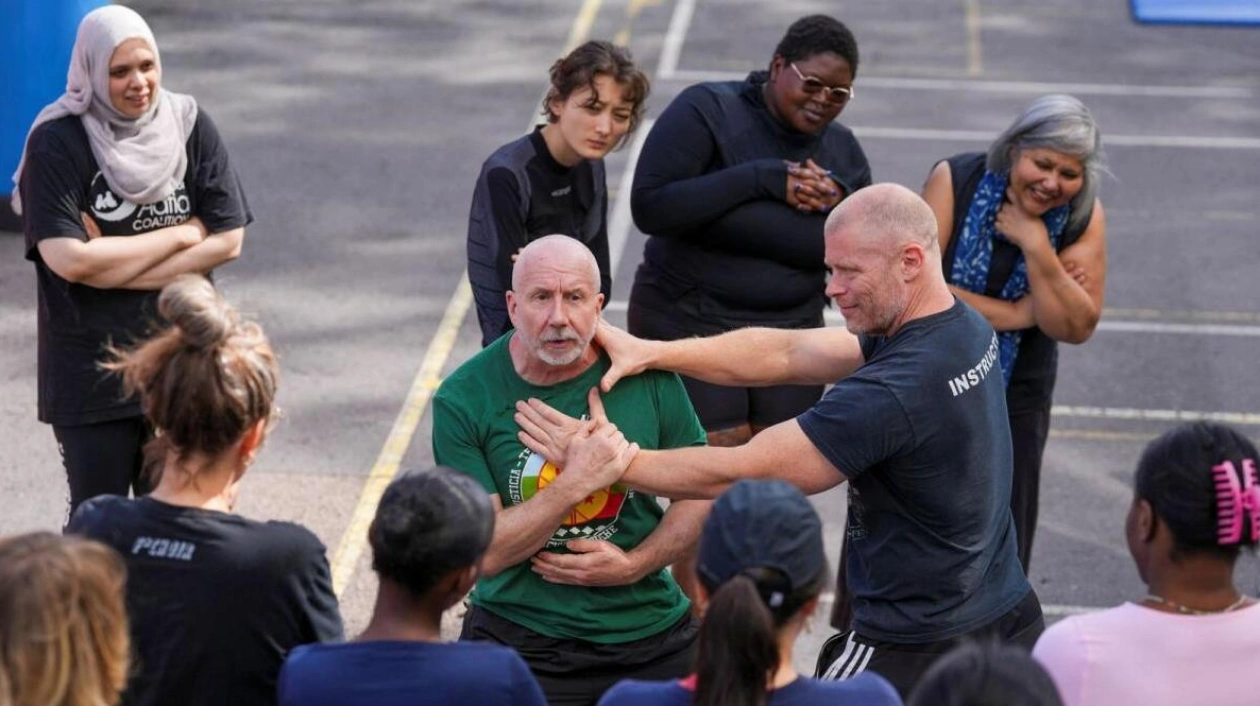At a sports ground in London, Maya Hassan watches with pride as approximately 30 women, mostly Muslim and from ethnic minorities, participate in a self-defense class she organized in response to a series of riots marked by violent, racist attacks on Muslims and migrants. The 28-year-old martial arts expert aims to empower women of color to handle abuse and foster connections and confidence, especially after over a week of unrest targeting mosques, asylum seeker accommodations, and police.
"It enhances your confidence," Hassan explains. "You gain an understanding of what to watch for, how to be socially aware, how to identify potential threats, and how to escape from a dire situation." The recent disorder was fueled by misinformation online suggesting the suspect in a fatal knife attack in Southport, northwest England, was a radical migrant. Martial arts instructor Stewart McGill has noticed an increase in female enrollment since the unrest began, teaching them defense techniques including kicks and improvised weapons like belts.
Elza Annan, 24, feels more confident after attending the class. "I hope I never have to use these techniques, but it's beneficial to know them... especially given the recent incidents involving far-right racists targeting people of color," she remarks. The riots primarily targeted migrants, Muslims, and Asians, instilling fear in ethnic minority communities and highlighting issues of integration in Britain. Tell MAMA UK, an organization tracking anti-Muslim incidents, reports a rise in hate crimes against Muslims, particularly since the Gaza conflict began on October 7 last year. Since the riots started, they have recorded over 500 incidents of anti-Muslim behavior across Britain.
Sunder Katwala, director of the think tank British Future, which addresses migration and identity, describes Britain as a "confident multi-ethnic democracy" at its best. However, he critiques successive governments for lacking a cohesive integration strategy, noting discrepancies in support for recent arrivals from Ukraine and Hong Kong compared to others. The asylum system is particularly strained, with a significant backlog of applications and concerns about the impact on housing, healthcare, and education. "With asylum, there's a visible lack of control, which can exacerbate fear," Katwala explains. The riots have largely subsided following large-scale anti-racism protests that defended potential targets such as immigration advice centers, mosques, and hotels housing asylum seekers.
Hassan, a Swiss national of Somali origin who moved to Britain in 2008, believes the country is more welcoming to ethnic minorities than many parts of Europe. She is contemplating organizing additional classes. A similar event is planned in Manchester, and The Three Hijabis, a campaign group, recently hosted a large online discussion with Muslim women to address the psychological toll of Islamophobic violence. Shaista Aziz, the group's director, notes that some women are so fearful of potential violence that they consider removing their hijabs for safety.
Prime Minister Keir Starmer has condemned the rioters as "far-right thugs" and has ordered enhanced protection for the Muslim community. Nearly 800 people have been arrested, with some swiftly processed through the courts and imprisoned. The anti-racism protests are expected to continue. Maki Omori, 23, who identifies as non-binary, found the self-defense class empowering for preparing against potential counter-protests. "I was quite intimidated, wondering how I would defend myself," Omori said. "I want to ensure that if anything happens, I feel prepared."






